Shipping Container Types Used in India: Dimensions, Uses, and Industry Applications
1. Introduction
In the bustling world of Indian international trade, shipping containers play a crucial role in moving goods across the country and beyond its borders. As the Indian economy continues to grow and integrate with global markets, understanding the various types of containers and their applications becomes increasingly important for businesses engaged in import, export, and domestic logistics.
This guide will walk you through the various types of shipping containers commonly used in India, their specifications, and how they're utilized in different Indian industries. Whether you're a seasoned logistics professional or new to the world of containerized shipping, this comprehensive overview will help you make informed decisions about your cargo transportation needs.
Container Type | Dimensions (L x W x H) | Capacity | Key Uses in India |
20′ x 8′ x 8’6″ | 33.2 m³ | SME exports, dense cargo | |
40′ x 8′ x 8’6″ | 67.7 m³ | Textiles, large shipments | |
40′ x 8′ x 9’6″ | 76.4 m³ | E-commerce, bulky items | |
20′ x 8′ x 8’6″ | 28.3 m³ | Short-distance perishables | |
40′ x 8′ x 8’6″ | 59.3 m³ | Long-distance cold chain | |
20′ x 8′ x 8’6″ | N/A | Oversized machinery | |
40′ x 8′ x 8’6″ | N/A | Wind turbine components | |
20′ x 8′ x 8’6″ | 32.6 m³ | Marble, granite exports | |
40′ x 8′ x 8’6″ | 67.3 m³ | Large machinery | |
20′ x 8′ x 8’6″ | 21,000-26,000 L | Chemicals, edible oils | |
40′ x 8′ x 9’6″ | Varies | Garment exports |
Standard Dry Containers
Standard dry containers are the workhorses of the Indian shipping industry, suitable for a wide range of cargo types. These versatile units form the backbone of containerized trade, handling everything from textiles to electronics.
20 feet Container
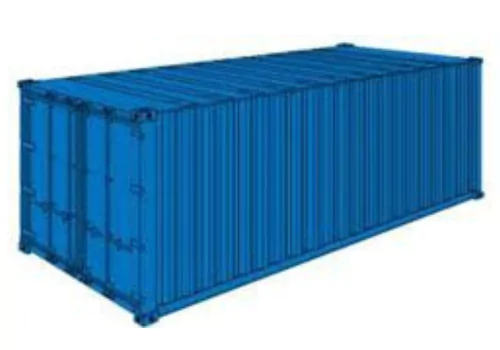
20 feet container specifications
- External Dimensions: 20′ x 8′ x 8’6″ (L x W x H)
- Internal Capacity: 33.2 m³
- Max Payload: 28,200 kg
Uses:
- Ideal for dense, heavy cargo like machinery, metals, and minerals
- Perfect for smaller shipments and partial container loads
- Commonly used for exports from small and medium enterprises in India
The 20-feet container is particularly popular among Indian SMEs due to its manageable size and lower shipping costs for smaller volumes. It's frequently used to transport goods from manufacturing hubs in cities like Pune, Coimbatore, and Ludhiana to major ports for export.
40 feet Container
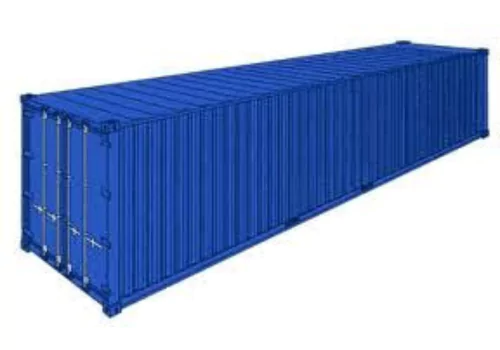
40 feet container size
- External Dimensions: 40′ x 8′ x 8’6″ (L x W x H)
- Internal Capacity: 67.7 m³
- Max Payload: 28,800 kg
Uses:
- Suitable for voluminous cargo like textiles, furniture, and consumer goods
- Efficient for large shipments from major manufacturing hubs in Gujarat, Maharashtra, and Tamil Nadu
- Cost-effective for long-distance shipping across India or internationally
The 40-feet container is a staple in India's export-oriented industries, such as textiles from Tirupur or automotive components from the Chennai region. Its larger capacity makes it ideal for consolidating shipments and reducing per-unit transportation costs.
40 feet High Cube Container
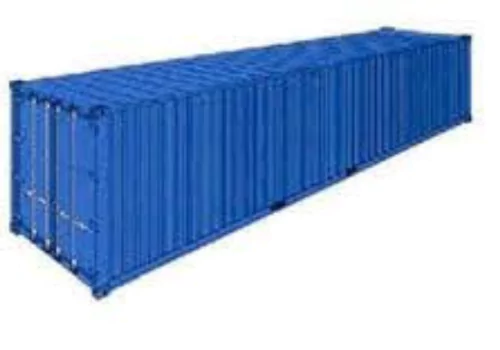
40 feet High Cube Container Dimensions
- External Dimensions: 40′ x 8′ x 9’6″ (L x W x H)
- Internal Capacity: 76.4 m³
- Max Payload: 28,500 kg
Uses:
- Ideal for light, bulky items like auto parts, electronics, and garments
- Popular for e-commerce logistics and retail distribution across India
- Extra height accommodates taller machinery or stacked pallets
High cube containers have gained popularity in India's growing e-commerce sector, allowing for efficient transportation of large volumes of consumer goods from warehouses to distribution centers across the country.
Specialized Containers
While standard containers handle a wide range of cargo, specialized containers cater to specific needs, from temperature-sensitive goods to oversized equipment. These specialized units play a crucial role in India's diverse export portfolio.
Refrigerated Containers (Reefers)
20 feet Reefer Containers
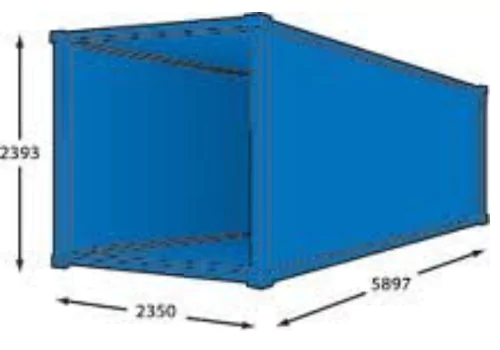
20 feet Reefer Containers Dimensions
- External Dimensions: 20′ x 8′ x 8’6″ (L x W x H)
- Internal Capacity: 28.3 m³
- Temperature Range: -30°C to +30°C
Uses:
- Essential for short-distance transport of perishables like fruits from Maharashtra or seafood from Kerala
- Ideal for pharmaceutical shipments from hubs like Hyderabad and Ahmedabad
40 feet Reefer Containers
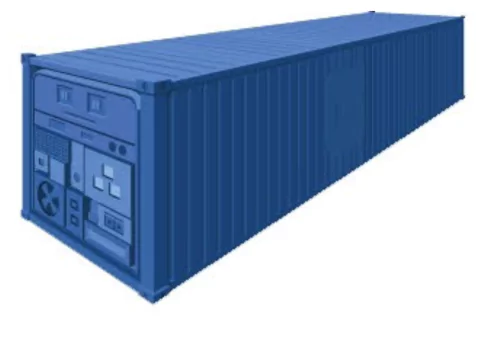
40 feet Reefer Containers Dimensions
- External Dimensions: 40′ x 8′ x 8’6″ (L x W x H)
- Internal Capacity: 59.3 m³
- Temperature Range: -30°C to +30°C
Uses:
- Perfect for long-distance transport of temperature-sensitive goods
- Used for bulk exports of mangoes, grapes, and other fruits from India to international markets
Reefer containers are crucial for India's growing cold chain logistics sector, supporting the export of temperature-sensitive products like Alphonso mangoes from Maharashtra or vaccines from Hyderabad's pharmaceutical cluster.
Flat Rack Containers
20 feet Flat Rack Containers
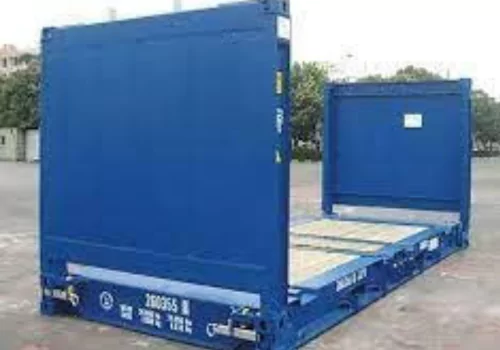
20 feet Flat Rack Containers Dimensions
- External Dimensions: 20′ x 8′ x 8’6″ (L x W x H)
- Max Payload: 28,000 kg
Uses:
- Ideal for oversized cargo like machinery or vehicles
- Commonly used in industrial corridors for transporting heavy equipment
40 feet Flat Rack Containers
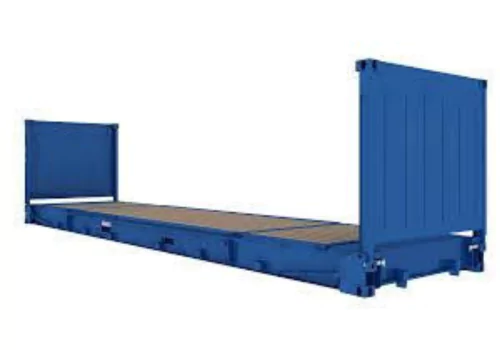
40 feet Flat Rack Containers Dimensions
- External Dimensions: 40′ x 8′ x 8’6″ (L x W x H)
- Max Payload: 40,000 kg
Uses:
- Perfect for extra-long or extra-wide cargo
- Used for shipping wind turbine blades from manufacturing plants in Tamil Nadu
Flat rack containers are essential for India's growing renewable energy sector, facilitating the transport of oversized components for wind and solar projects.
Open Top Containers
20 feet Open Top Containers
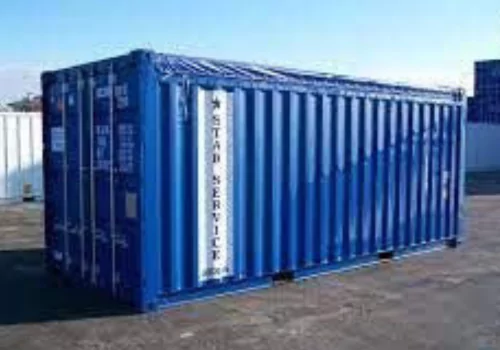
20 feet open top container dimensions
- External Dimensions: 20′ x 8′ x 8’6″ (L x W x H)
- Internal Capacity: 32.6 m³
Uses:
- Suitable for tall or oddly-shaped cargo that’s difficult to load through doors
- Used for transporting marble blocks from Rajasthan or granite from Karnataka
40 feet Open Top Containers
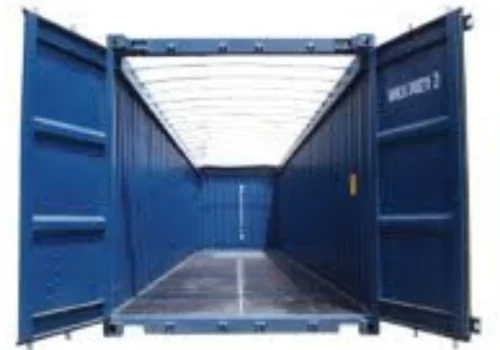
40 feet Open Top Containers Dimensions
- External Dimensions: 40′ x 8′ x 8’6″ (L x W x H)
- Internal Capacity: 67.3 m³
Uses:
- Ideal for large machinery or oversized equipment
- Used in construction projects for transporting lengthy materials
Open top containers play a crucial role in India's stone export industry, allowing for easy loading of heavy marble and granite blocks from quarries in Rajasthan and Karnataka.
ISO Tank Containers
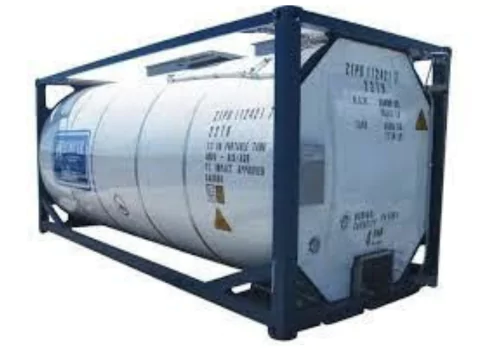
ISO Tank Containers Dimensions
- External Dimensions: 20′ x 8′ x 8’6″ (L x W x H)
- Capacity: 21,000 – 26,000 liters
Uses:
- Essential for bulk liquid transport
- Used for chemicals from Gujarat’s industrial belt or edible oils from northern India
Tank containers are vital for India's chemical and edible oil industries, enabling safe and efficient transport of liquid cargo from production centers to ports and domestic markets.
Garment on Hanger (GOH) Containers
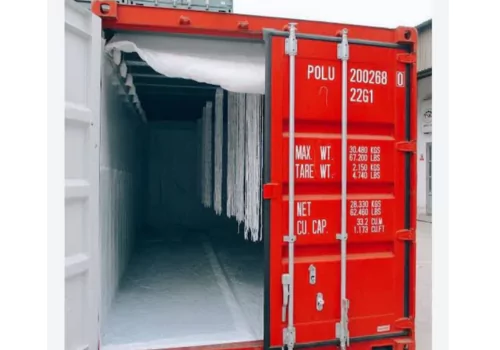
Garment on Hanger (GOH) Containers Dimensions
- External Dimensions: 40′ x 8′ x 9’6″ (L x W x H)
- Features: Equipped with hanging rails
Uses:
- Designed for transporting garments on hangers
- Popular in textile hubs like Tirupur and Surat
- Ensures wrinkle-free transportation of high-value clothing items
GOH containers are specialized units that cater to India's thriving garment export industry, preserving the quality of finished apparel during transit from manufacturing centers to global markets.
Choosing the Right Shipping Container
Selecting the appropriate container type is crucial for ensuring your cargo's safety and optimizing shipping costs. Consider these factors when choosing a container for your Indian cargo:
- Cargo Type: Is your cargo dry goods, perishables, liquids, or specialized items?
- Size and Weight: How much space does your cargo need? What's its total weight?
- Special Requirements: Does your cargo need temperature control, ventilation, or special loading options?
- Journey Length: Are you shipping domestically within India or internationally?
- Cost Efficiency: Would consolidating cargo into a larger container be more economical?
- Loading and Unloading: Do you need special access for loading, such as open tops or sides?
- Regulatory Compliance: Are there any specific shipping regulations for your cargo type?
India's Growing Containerized Trade
India's burgeoning economy and increasing international trade have led to a surge in containerized cargo movement. Major Indian ports like Jawaharlal Nehru Port Trust (JNPT) near Mumbai, Mundra Port in Gujarat, and Chennai Port in Tamil Nadu handle a significant volume of container traffic.
According to recent data from the Indian Ports Association, container traffic at major ports has shown steady growth, reflecting the country's expanding role in global trade. This growth has been supported by initiatives like the "Sagarmala" project, which aims to modernize India's ports and enhance their capacity.
Conclusion
Understanding the various types of shipping containers commonly used in India is essential for efficient and cost-effective logistics management. Whether you're exporting textiles from Mumbai, pharmaceuticals from Hyderabad, vehicles from Chennai, or bulk liquids from Gujarat, choosing the right container can significantly impact your supply chain efficiency and bottom line.
As India continues to strengthen its position in global trade, the demand for diverse container types will only increase. Businesses that stay informed about container options and optimize their choices will be better positioned to compete in both domestic and international markets.
Remember to consider factors such as cargo type, dimensions, special requirements, and cost-efficiency when selecting a container for your shipments. By making informed decisions, you can ensure that your goods reach their destination safely, efficiently, and cost-effectively, contributing to the success of your business in India's dynamic trade environment.
For the most up-to-date information on container availability, port operations, and shipping regulations in India, it's advisable to consult with reputable shipping lines, freight forwarders, and official port authority websites. Stay informed, plan ahead, and leverage the right container solutions to drive your business forward in India's exciting and rapidly evolving logistics landscape.

